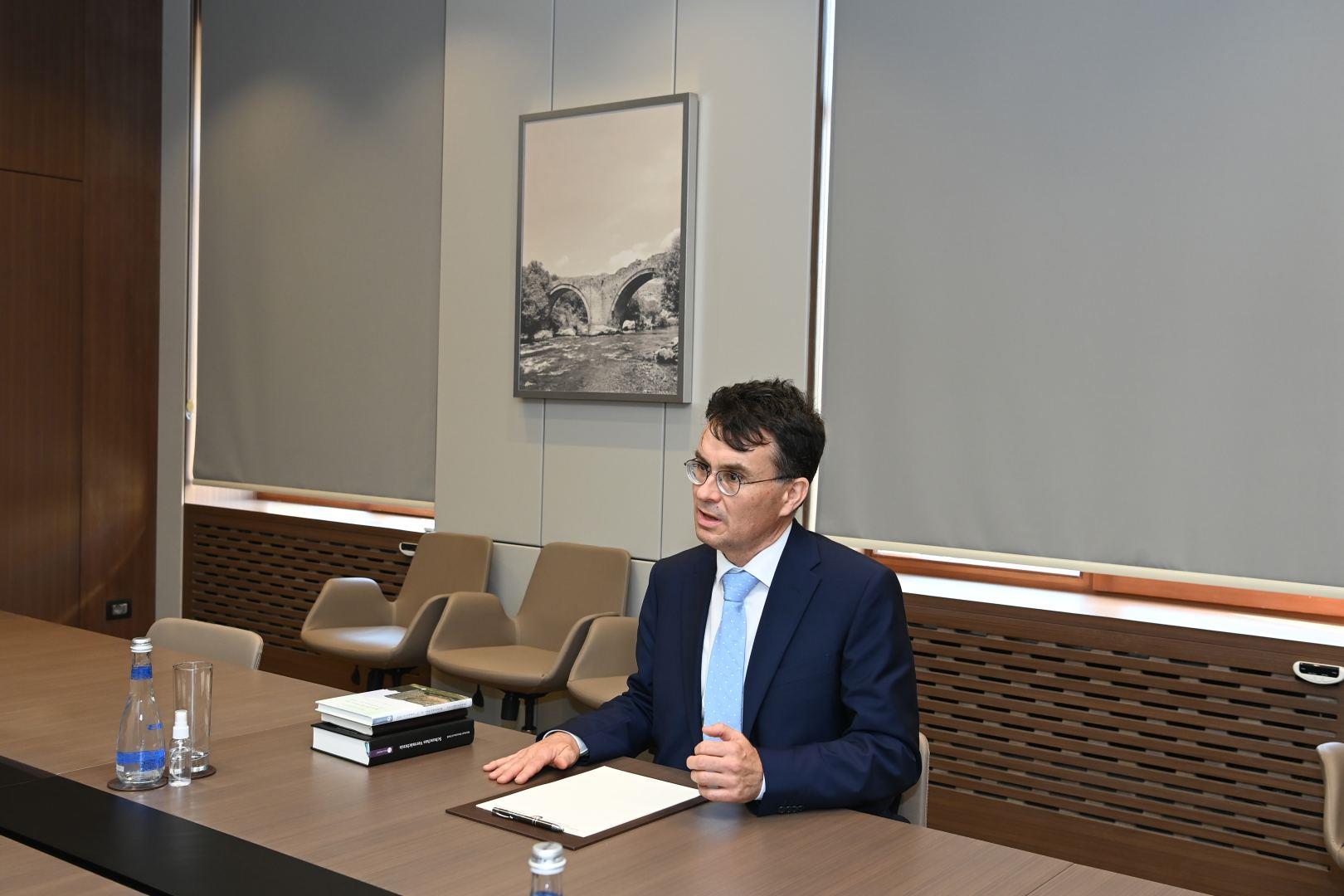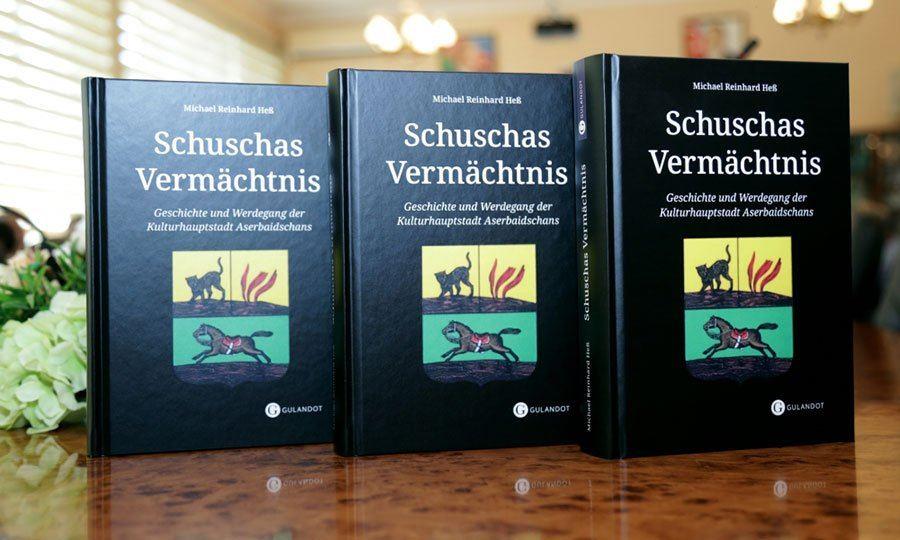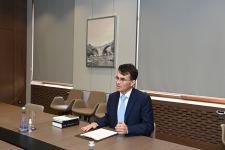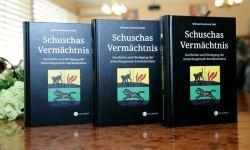(MENAFN- Trend News Agency) BAKU, Azerbaijan, August 18. The German weekly
newspaper Die Zeit published an article "Forgotten by the World:
Nagorno-Karabakh," co-authored by Alice Botha and Maria Mitrov,
trend reports.
The article, which contains unverified data, incorrect
terminology, and baseless and unfair accusations against Azerbaijan
and its leadership, was written unilaterally from the position of
Armenia and Armenian separatists.
The article states that "Azerbaijan subjected Nagorno-Karabakh
to real starvation for a month. The statistics of childbirths with
defects increased because pregnant women were not examined, and
people threw their dogs and cats into the street because they had
no food to feed even themselves".
Showing diligence, the authors added to the article published in
August a picture of some teacher in a winter coat, taken somewhere
and sometime, writing that allegedly "because Azerbaijan is holding
Artsakh's only gas pipeline under blockade, the stoves in schools
are heated with wood?". Moreover, based on conversations with local
residents, they even dared to call it "genocide and ethnic
cleansing".
Michael Reinhard Hess, a well-known German scholar, researcher
of the Caucasus region, and author of the book "The Heritage of the
Shush City," sent a detailed and reasoned letter of protest to the
editorial board of "Die Zeit" newspaper and shared it on his
Facebook page.
Hess notes that the use of the word "Nagorno-Karabakh enclave"
in the first sentence of the article explains the position from
which it was written.
"Karabakh is the territory of the Azerbaijani state with all its
parts, including the mountainous parts. How can one call an enclave
a territory that even Armenia, the sponsor of the so-called
Armenian separatist organization, has never perceived as an
enclave? It is not known from what source the legend about the
"Nagorno-Karabakh enclave" was taken, but this word is used by all
leading media in Germany, including "Spiegel". How can unverified
data from one of the interested parties be disseminated?" The
letter reads:
Due to his own observations, he also sharply condemned another
negative practice entrenched in the German press.
"For 4 years in the leading German media, practically not a
single article has been published in order to reflect the views of
Azerbaijan along with the position of Armenians or even
separatists. If the authors would look through social networks for
a few minutes, they would see how Azerbaijanis have lost their
property and health as a result of Armenian aggression and
occupation. Those who, after 30 years, return to Karabakh,
liberated as a result of the 44-day war, face the sad consequences
of the destructive activities of Armenian aggressors," the letter
noted.
Hess criticized the idea of the article about "an enclave, which
is already fully populated by Armenians", reminding the authors of
the 1989 population statistics.
"At that time, 21 percent of the population of the
Nagorno-Karabakh Autonomous Region, that is, 40,000 people, were
Azerbaijanis, and they did not disappear anywhere. They were
expelled from their homes as a result of Armenian aggression and
violence. The authors of the article say nothing about this
misfortune faced by Azerbaijanis. On the night of February 25–26,
1992, 613 innocent Azerbaijani civilians were mercilessly killed
under the command of Serzh Sargsyan, who later became Defense
Minister and President of Armenia. A grave war crime was committed
with the massacre of civilians. It would be appropriate to draw
parallels between the genocide in Khojaly and what happened in
Irpin and Bucha.
After the full establishment of Azerbaijan's state control over
these territories, the security of the Armenian population in
Karabakh will be guaranteed. This was publicly stated by the
President of Azerbaijan, Ilham Aliyev. In other parts of
Azerbaijan, in addition to the territories inhabited by
separatists, there are currently tens of thousands of Armenians who
speak their own language and develop their own culture. If
Azerbaijan's intention was to expel Armenians, how could tens of
thousands of Armenians still live here? Conversely, Armenia
historically became a homogeneous state after the complete
expulsion of Azerbaijanis living there in 1987. What is happening
now has nothing to do with ethnic cleansing against Armenians. It
is about the fact that those who oppose Azerbaijan with weapons in
their hands are subject to the laws of Azerbaijan, the state in
which they live," he noted.
Hess also advised the authors to pay attention to the gaps and
contradictions they allowed in the article.
"You write that the blockade began in December, and then you
admit that Russian peacekeepers and ICRC vehicles are delivering
humanitarian aid and transporting the sick. How can this happen on
a blocked road? On April 23, Azerbaijan established a border
checkpoint on its territory on the state border with Armenia in
order to prevent the smuggling of weapons and illegal goods to the
separatist-controlled territories. Having read Libération/AFP and
other neutral sources, it is clear that the information contained
in Azerbaijani sources is true," he emphasized.
Hess goes on to express his disappointment that influential
press such as Die Zeit is sensation-seeking when writing about such
a serious topic.
"You write that 'Russia is arming Azerbaijan.' What does it mean
to present Azerbaijan as a scarecrow dependent on Russia?
Azerbaijan has been an independent state since 1991 and should not
wait for Russia or other countries to give it permission to arm
itself. It is logical to write that "Russia and India are also
arming Armenia". All such word combinations and the purpose of the
article are not to move away from the entrenched and prevailing
opinion in the leading German press, according to which "Armenians
in Karabakh are innocent victims and Azerbaijanis are evil people
with bad intentions"," the letter reads.



